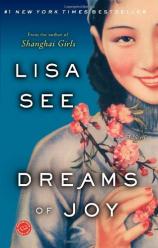Excerpt
Excerpt
Dreams of Joy

The wail of a police siren in the distance tears through my body. Crickets whir in a never- ending chorus of blame. My aunt whimpers in her twin bed at the other end of the screened porch we share— a reminder of the misery and embarrassment from the secrets she and my mother threw at each other during their argument tonight. I try to listen for my mother in her room, but she’s too far away. That silence is painful. My hands grab the bedsheets, and I struggle to focus on an old crack in the ceiling. I’m desperately attempting to hang on, but I’ve been on a precipice since my father’s death, and now I feel as though I’ve been pushed over the edge and am falling.
Everything I thought I knew about my birth, my parents, my grandparents, and who I am has been a lie. A big fat lie. The woman I thought was my mother is my aunt. My aunt is actually my mother. The man I loved as my father was not related to me at all. My real father is an artist in Shanghai whom both my mother and aunt have loved since before I was born. And that’s only the tip of the iceberg— as Auntie May might say. But I was born in the Year of the Tiger, so before the gnawing blackness of guilt about my dad’s death and the anguish I feel about these revelations overpower me, I grip the sheets tighter, set my jaw, and try to force my emotions to cower and shrink before my Tiger ferocity. It doesn’t work. I wish I could talk to my friend Hazel, but it’s the middle of the night. I wish even more that I could be back at the University of Chicago, because my boyfriend, Joe, would understand what I’m going through. I know he would.
It’s two in the morning by the time my aunt drifts off to sleep and the house seems quiet. I get up and go to the hall, where my clothes are kept in a linen closet. Now I can hear my mother weeping, and it’s heartbreaking. She can’t imagine what I’m about to do, but even if she did, would she stop me? I’m not her daughter.
Why should she stop me? I quickly pack a bag. I’ll need money for where I’m going, and the only place I know to get it will bring me more disgrace and shame. I hurry to the kitchen, look under the sink, and pull out the coffee can that holds my mother’s savings to put me through college. This money represents all her hopes and dreams for me, but I’m not that person anymore. She’s always been cautious, and for once I’m grateful. Her fear of banks and Americans will fund my escape.
I look for paper and a pencil, sit down at the kitchen table, and scrawl a note.
Mom, I don’t know who I am anymore. I don’t understand this country anymore.
I hate that it killed Dad. I know you’ll think I’m confused and foolish. Maybe I am, but I have to find answers. Maybe China is my real home . . .
I go on to write that I mean to find my real father and that she shouldn’t worry about me. I fold the paper and take it to the porch. Auntie May doesn’t stir when I put the note on my pillow. At the front door, I hesitate. My invalid uncle is in his bedroom at the back of the house. He’s never done anything to me. I should tell him good- bye, but I know what he’ll say. “Communists are no good. They’ll kill you.”
I don’t need to hear that, and I don’t want him to alert my mother and aunt that I’m leaving.
I pick up my suitcase and step into the night. At the corner, I turn down Alpine Street, and head for Union Station. It’s August 23, 1957, and I want to memorize everything because I doubt I’ll ever see Los Angeles Chinatown again. I used to love to stroll these streets, and I know them better than anyplace else in the world. Here, I know everyone and everyone knows me. The houses— almost all of them clapboard bungalows— have been what I call Chinafied, with bamboo planted in the gardens, pots with miniature kumquat trees sitting on porches, and wooden planks laid on the ground on which to spread leftover rice for birds. I look at it all differently now. Nine months at college— and the events of tonight— will do that. I learned and did so much at the University of Chicago during my freshman year. I met Joe and joined the Chinese Students Democratic Christian Association. I learned all about the People’s Republic of China and what Chairman Mao is doing for the country, all of which contradicts everything my family believes. So when I came home in June, what did I do? I criticized my father for seeming as if he were fresh off the boat, for the greasy food he cooked in his café, and for the dumb TV shows he liked to watch.
These memories trigger a dialogue in my head that I’ve been having since his death. Why didn’t I see what my parents were going through? I didn’t know that my father was a paper son and that he’d come to this country illegally. If I’d known, I never would have begged my dad to confess to the FBI— as if he didn’t have anything to hide. My mother holds Auntie May responsible for what happened, but she’s wrong. Even Auntie May thinks it was her fault. “When the FBI agent came to Chinatown,” she confessed to me on the porch only a few hours ago, “I talked to him about Sam.” But Agent Sanders never really cared about my dad’s legal status, because the first thing he asked about was me.
And then the loop of guilt and sorrow tightens even more. How could I have known that the FBI considered the group I joined a front for Communist activities?
We picketed stores that wouldn’t allow Negroes to work or sit at the lunch counter.
We talked about how the United States had interned American citizens of Japanese descent during the war. How could those things make me a Communist? But they did in the eyes of the FBI, which is why that awful agent told my dad he’d be cleared if he ratted out anyone he thought was a Communist or a Communist sympathizer.
If I hadn’t joined the Chinese Students Democratic Christian Association, the FBI couldn’t have used that to push my father to name others— specifically me. My dad never would have turned me in, leaving him only one choice. As long as I live I will never forget the sight of my mother holding my father’s legs in a hopeless attempt to take his weight off the rope around his neck, and I will never ever forgive myself for my role in his suicide.
Dreams of Joy
- paperback: 400 pages
- Publisher: Random House Trade Paperbacks
- ISBN-10: 0812980549
- ISBN-13: 9780812980547








